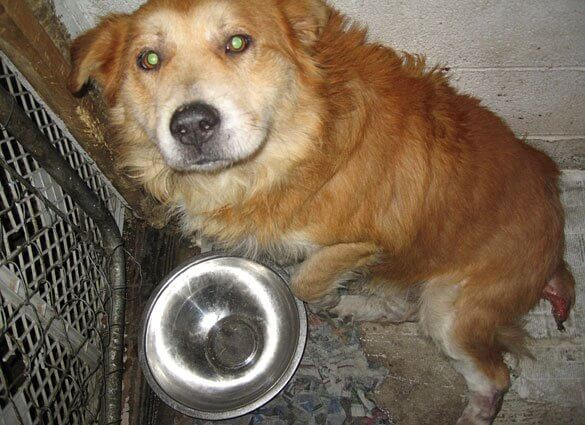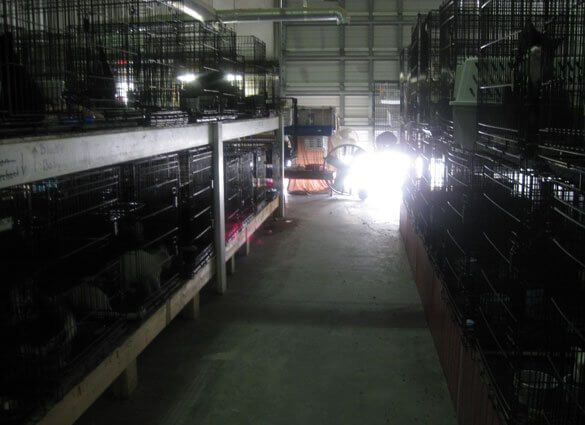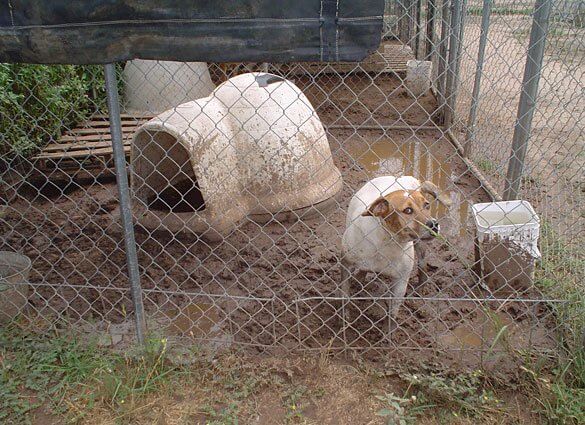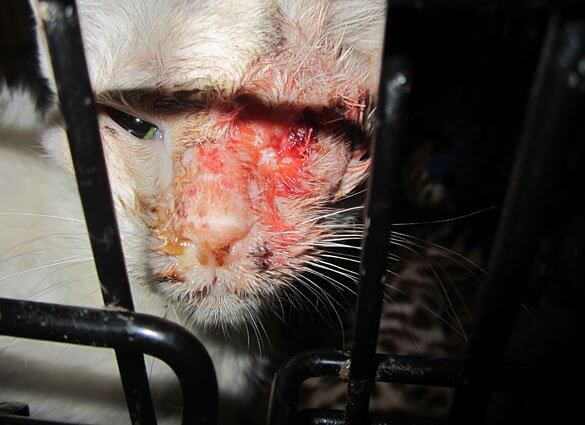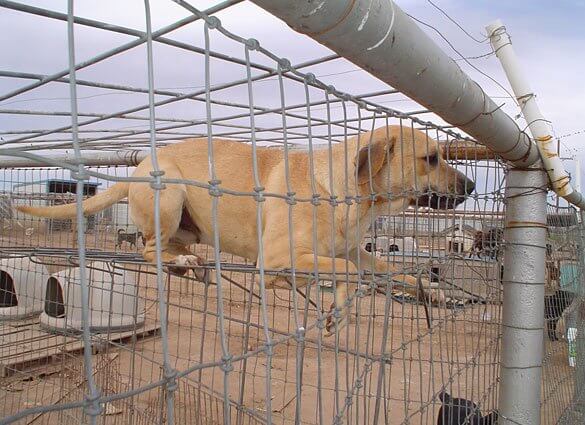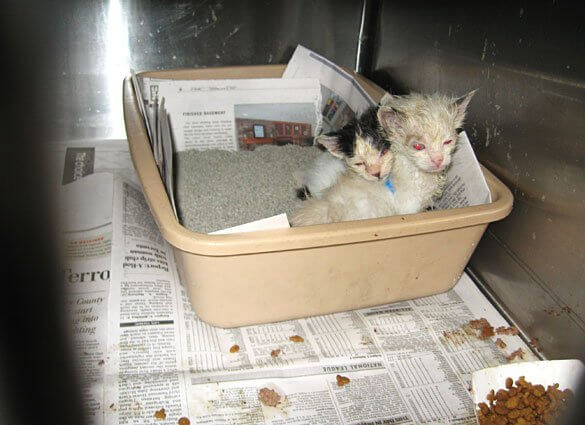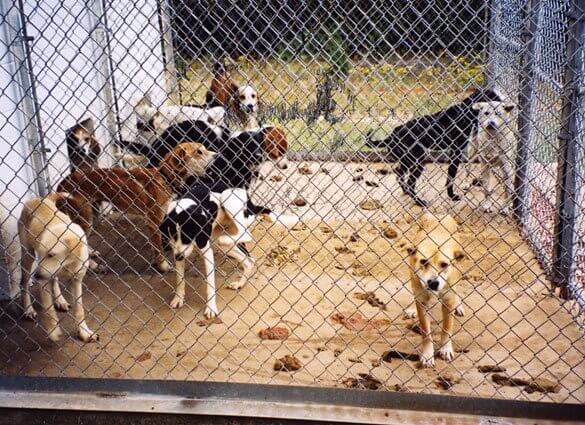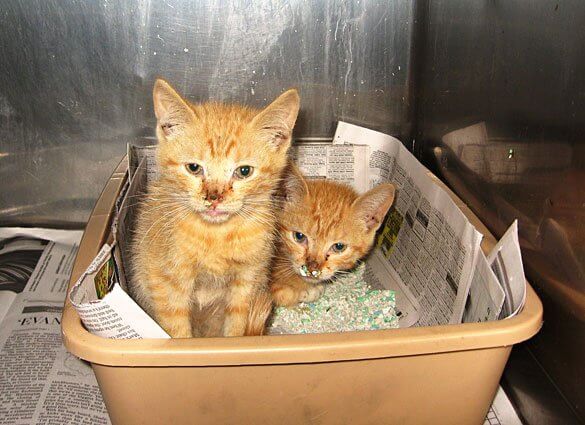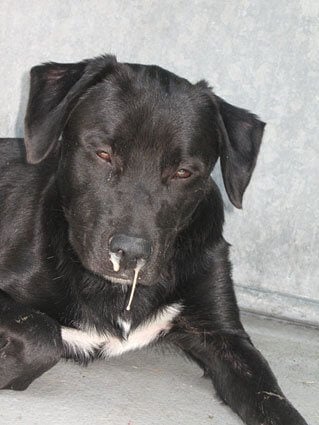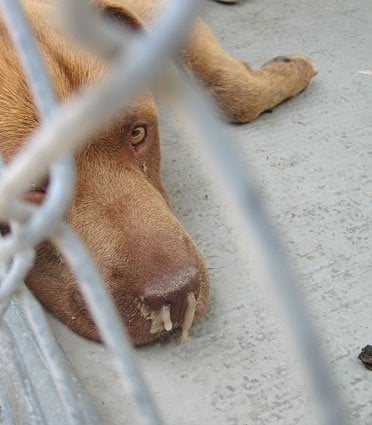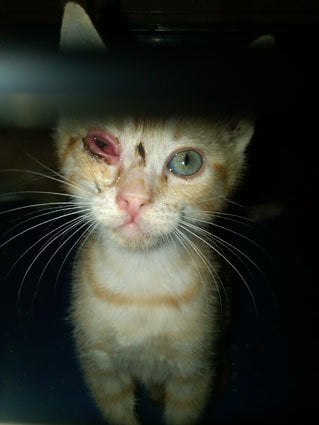‘No-Kill’ Policies Slowly Killing Animals 2014
When “no-kill” animal shelters and rescue groups are filled to capacity, which is almost always, they are left with two options: turn away more animals than they take in or warehouse animals, often in substandard, filthy, and severely crowded conditions, for weeks, months, or even years on end. Most, if not all, of the animals who are turned away from such facilities still face untimely deaths—just not at these facilities.
Instead they are cruelly killed by people who don’t want them, are dumped on roadsides and left to die from starvation or being hit by a car, or spend their short lives homeless, unwanted, and producing more litters of animals for whom no homes exist.
The lucky ones are taken to well-run open-admission animal shelters, where they either find a well-screened, permanent home or are painlessly euthanized in the arms of professionally trained, compassionate people. Here are some of the “no-kill” animal shelter failures that made headlines in recent years for making animals suffer a fate far worse than a kind death.
Reports Showing How ‘No-Kill’ Policies Harmed Animals in December 2014
Lowell, Indiana
NWITimes.com reported that authorities removed ten live and two dead dogs from a “no-kill” shelter reportedly run by PawsHere Foundation, Inc. The ten live dogs were reportedly emaciated, dirty, and living in feces and urine. The two dead dogs were also emaciated and appeared to have died from exposure or starvation. Authorities were not sure if all of the surviving dogs would make it and described them as being in “very bad shape.” A mass grave with “numerous canine remains” was reportedly also found on the property, which a Lake County Sheriff’s Department Detective reportedly described as “completely disgusting.” Charges of animal neglect and harboring non-immunized dogs were reportedly expected to be brought against the “rescue’s” owner.
Lake Oswego, Oregon
PortlandTribune.com reported that the operator of Oregon Cat Project had been charged with two counts of animal neglect in the second degree after police investigated a complaint alleging “several cats locked in cages without care” at the group’s shelter. One of the charges was reportedly in relation to the medical condition of a cat left at a Petco store, where the group allegedly abandoned 42 cats, “many of whom had upper respiratory infections and other medical problems.”
Lakewood, Washington
TheNewsTribune.com reported that PURRR Rescue had been “pushed out” of two towns after incidents in which the organization reportedly adopted out dangerous dogs who killed other animals. In one reported incident, one hour after being adopted a dog obtained through PURRR killed the adopting family’s cat. A few days later, the same dog reportedly “broke out of her cage, busted through two doors” and killed the family’s 10-week-old kitten. Two other families shared similar stories—they reportedly adopted from PURRR dogs who killed “a pair of dogs in two incidents over a 15-day span.”
Reports Showing How ‘No-Kill’ Policies Harmed Animals in November 2014
Bradley County, Tennessee
TimesFreePress.com reported that the board of directors of the Society for the Prevention of Cruelty to Animals of Bradley County had decided to abandon the shelter’s “no-kill” mission. A spokesperson for the group reportedly stated that, “[t]here is a capacity of that building…There’s also a capacity of the revenue for us to care for and provide food and waste services for the animals that are there.”
Oneida County, New York
LegalNewsline.com reported that Lucky Dog Rescue, run by the company Mohawk Valley Inc., which had allegedly been illegally raising funds, was shut down by an order of the Supreme Court of Oneida County. The “rescue” and its registered owner allegedly raised money by promoting itself as a dog shelter that housed neglected, abandoned and abused dogs. The New York Attorney General alleged that very few animals benefited from the funds.
Las Vegas, Nevada
JRN.com reported that former volunteers at Southern Nevada Bully Breed Rescue (SNBBR) alleged that dogs at the facility “were crated for up to 20 hours a day, rarely got fresh air and often were kept in darkness with little human contact. … [S]ome crates were completely covered.” Aggressive dogs were reportedly kept in total isolation and darkness in a room called “the box.” SNBBR reportedly obtained many dogs from a local open-admission shelter operated by The Animal Foundation through an agreement that was ended in August 2014 after SNBBR was evicted from a building it had been using.
Gilmer, Texas
TylerPaper.com reported that two men who’d claimed to be operating a “rescue” group called Paws of Protection Rescue agreed to forfeit custody of 37 dogs seized by law-enforcement officials after the animals were found largely underweight and suffering from hair loss and “various infections.” Three dead dogs—one of whom had apparently been decapitated—were also reportedly removed. The men faced felony and misdemeanor cruelty-to-animals charges.
Arleta, California
LATimes.com reported that cruelty-to-animals charges had been filed against a couple who allegedly obtained animals from local animal shelters and “then solicited donations from the public to help pay for the animals’ care.” Authorities reportedly removed nearly 100 dogs from the couple’s home. The dogs were said to be suffering from contagious diseases and had been confined to crowded cages that were “stacked like cargo boxes.” Several dogs were apparently emaciated, infested with intestinal parasites, suffering from mange and heartworm disease, and sick with upper respiratory infections. One dog’s paws were reportedly infected from standing in feces and urine.
Eaton, Ohio
RegisterHerald.com reported that the Humane Society of Preble County’s Pet Center had become a “no-kill” facility for cats. The article stated, “The shelter wants the public to know, this means that the Pet Center cannot take in feral cats, or some adult cats. Healthy, socialized kittens will be admitted on a limited basis.”
Wooster, Ohio
The-Daily-Record.com reported that a trial had begun for a woman who was charged with cruelty to animals after a “rescue” that she had been running out of her home was raided. ThePostNewspapers.com had identified the “rescue” in an earlier report as Bright Futures Rescue and Adoption. During the trial, evidence was presented that reportedly showed matted dog hair and a build-up of feces that was “carved off a dog cage.” Forty-seven dogs had reportedly been seized during the raid.
Reports Showing How ‘No-Kill’ Policies Harmed Animals in October 2014
Jackson, Missouri
KFVS12.com reported that the Missouri State Attorney General’s Office had filed a complaint against Safe Harbor Animal Sanctuary and its operator alleging that the “sanctuary” had violated the state’s Animal Care Facilities Act by failing to provide the animals in its care with adequate veterinary treatment and to follow health and husbandry procedures. The facility was also accused of failing to keep sufficient records showing when and how animals in its care had died.
North Franklin Township, Pennsylvania
Observer-Reporter.com reported that a woman running a volunteer “rescue” group called Marcia’s Muttley Crew out of her home faced nearly 60 citations, including some for cruelty to animals, filed by the state’s Department of Agriculture. At the time of the citations, the woman reportedly had 22 dogs at her home, and an air test revealed that the environment in the home was “not healthy.” She was reportedly ordered to reduce the canine population at the residence to four.
Belton, South Carolina
IndepententMail.com reported that the operator of J’s Kitten Cottage “rescue” was facing a felony charge of misusing more than $11,000 that was solicited to care for homeless cats. She instead allegedly spent the money on personal expenses. The operator was reportedly charged with ill treatment of animals in June 2014 after police removed 69 cats from her home, 37 of whom were reportedly dead. The 32 surviving cats had been taken to the county’s animal shelter.
Austin, Texas
KVUE.com reported that the city’s “no-kill” animal shelter was 90 percent over capacity and that adoptions were down.
Reports Showing How ‘No-Kill’ Policies Harmed Animals in September 2014
Atwater, California
FresnoBee.com reported that an inspection of the Last Hope Cat Kingdom “no-kill” facility by Merced County authorities documented unsanitary conditions, including excessive amounts of feces in litterboxes and on the ground. Inspectors reportedly also observed a cat whose eye was encrusted with discharge.
Warsaw, New York
TheDailyNewsOnline.com reported authorities had removed more than 100 cats, both dead and alive, and at least one dead dog from the residence of the operators of Little Paws Big Hearts animal “rescue.” The owners were reportedly charged with misdemeanor torturing or injuring animals, and the home was condemned. A Wyoming County animal control officer on the scene reported that many of the animals were dehydrated and had symptoms of contagious diseases. Several cats reportedly had to be euthanized immediately because of the severity of their illnesses. Conditions were apparently so vile that the veterinarians working to assist in the removal and treatment of the animals became ill.
Calgary, Canada
SunNewsNetwork.ca reported that an SUV hauling a horse trailer carrying 30 dogs from California to Edmonton in the company of two “animal rescuers” rolled over on Highway 2. Two dogs were reportedly killed in the impact, and 20 were hurt. A third dog died after the accident. Six of the surviving dogs were reportedly taken to a local shelter. It was unclear what happened to the others.
McAllen, Texas
TheMonitor.com reported that the owner of Franklin All Animal Rescue Team (FAART) had been cited for “city ordinance violations regarding animal care at his property, ” that he was suspected of having been involved in dogfighting at one time, and that another group had “received sick dogs from [FAART] who were being transported to different shelters and foster homes.” FAART’s owner would reportedly be expected in court in relation to the animal care citation.
Reports Showing How ‘No-Kill’ Policies Harmed Animals in August 2014
Yolo County, California
News10.net reported that authorities removed 11 emaciated and “severely neglected” Rottweilers from Second Chance Rottweiler Rescue, where they were found living amid their own feces. The animals’ conditions reportedly ranged from serious to critical, and another three dogs were found dead at the property. Multiple counts of cruelty-to-animals charges were being considered.
Fountain Hills, Arizona
KPHO.com reported that a “cat rescue volunteer” had been arrested and charged with 18 counts of cruelty to animals after authorities found 50 cats in a home in which investigators were reportedly “walking through literally 2 feet of feces.” The outlet reported: “A 15-year career animal crimes deputy, Dave Evans, who has investigated numerous homicides and meth labs, stressed what he saw and smelled there was unlike anything he has ever encountered …. ‘The stench from the cat urine and feces was so unbearable, we considered calling a hazmat team to clear the area,’ Evans said. ‘It was far worse than any homicide scene I’ve investigated.’”
St. Lucie County, Florida
TCPalm.com reported that approximately 80 animals had been removed from a “no-kill” shelter operated by All Pet Rescue after they were found confined to tiny cages, “with barely enough room [to] turn around” in an uninsulated metal warehouse without air conditioning. The only water available to the animals was reportedly “covered with green algae” and “not fit to drink.”
Olympia, Washington
KONP.com reported that the Washington State Attorney General’s Office had sued the founder of Olympic Animal Sanctuary (OAS) alleging that the “sanctuary” had collected hundreds of thousands of dollars in charitable donations without having registered as a charity with the secretary of state. OAS was also accused of failing to maintain records showing how the charitable donations had been spent.
McClain County, Oklahoma
KOCO.com reported that authorities were investigating conditions at Forgotten Angels Animal Sanctuary after having received complaints from a volunteer at the “sanctuary” who had reportedly claimed to have seen dogs there infested with fleas and ticks and with open, oozing wounds and green secretions running from their eyes and noses.
Calverton, New York
NewYork.CBSLocal.com reported that a court had ordered Precious Pups dog “rescue” to close after allegations were made that neglected dogs were being obtained by the “rescue” and then simply resold, apparently for a profit and without receiving needed veterinary medical care.
Monroe County, Pennsylvania
PoconoRecord.com reported that the manager of a “no-kill” shelter called Animal Welfare Society of Monroe had been bitten by a cat who was being turned away along with her “several sick kittens” by the shelter. The shelter’s operations director reportedly told the outlet: “We don’t take in feral cats because they’re not adoptable and no one knows what kinds of diseases they might have. … We generally don’t take animals that are too aggressive to approach because they’re likewise not adoptable .…We also generally don’t take animals with scratch or bite marks because they might have gotten those wounds from other possibly rabid animals .…” What ultimately happened to the cat and kittens was not reported.
San Antonio, Texas
ExpressNews.com reported that in an effort to win a $100,000 prize in a contest to euthanize the fewest animals of 50 shelters in the area, the San Antonio Animal Care Services (SAACS) shelter had reportedly become crowded with sick animals and had stopped accepting stray animals taken to the shelter by members of the public.
Highlands County, Florida
HighlandsToday.com reported that animal abandonment was increasing in the area. A local “no-kill for space” shelter told the outlet that when citizens find out that the shelter is full, they often abandon the animals in front of the building, along a busy road. The group’s president said, “We see dead animals in front of our facility all the time.”
Reports Showing How ‘No-Kill’ Policies Harmed Animals in July 2014
LaPlace, Louisiana
NOLA.com reported that the owner of Happy Yappy Doggy Rescue had been jailed on charges relative to “operating an illegal dog rescue service” that reportedly had been keeping 50 dogs in unsanitary conditions. Some animals were reportedly confined to plastic travel carriers soiled with urine and feces, and others were confined to a garage. Some of the animals were housed without food, water, or adequate air circulation. The animals were removed by authorities.
Lancaster, Ohio
LancasterEagleGazette.com reported that two cats were shot by a trailer park resident—one of the animals was killed, and the other reportedly sustained life-threatening injuries. The executive director of the local humane society reportedly told the outlet that the incident sheds light on a local stray cat problem and that the shelter is “at its capacity for cats.” He added, “We get those calls on a daily basis.” He said that if there were no limit as to how many cats the society could handle, dozens would be dropped off every day. One man reportedly visited the shelter and said that if he couldn’t leave the cat, he was “just going to shoot it.”
Bradley County, Tennessee
WRCB-TV reported that the SPCA of Bradley County was violating the county’s contract by turning animals away. The news report was prompted after a boy in the community was mauled by a dog—animal shelter workers didn’t pick the canine up until one day after the attack occurred.
Macon, Georgia
Macon.com reported that a former volunteer with Macon Purrs N Paws was charged with 17 counts of aggravated cruelty to animals after 15 cats and dogs were found “alive but in bad shape” in an abandoned house that had no running water, electricity, or air conditioning. The animals had apparently been without food, water, and other care for at least two days, and rescuers had to wear face masks because of the strong foul odor. The cats were reportedly found in small carriers with little room to move and no access to litterboxes, and one cat was found dead.
North Las Vegas, Nevada
JRN.com reported that 112 cats had been removed from a local animal “rescuer’s” home that reportedly lacked running water and air conditioning. The floor reportedly was covered with feces that was approximately 1 inch deep. Some of the cats reportedly had feces matted to their faces, and at least two animal control officers had to be treated at the scene after becoming overwhelmed by the strong foul odor. Charges were being considered.
Wolfe City, Texas
Dallas.CultureMap.com reported that authorities seized approximately 222 animals from a “no-kill” facility called the Frank Barchard Memorial Shelter after finding them cruelly confined and in need of medical care. Two kittens, one cat, and a puppy were reportedly found dead. Investigators reportedly said that other animals had been found suffering from open wounds, eye and nasal discharge, hair loss, open surgery incisions, matted hair, tick infestation, long nails, missing eyes, and other health problems. Some were also underweight. It was not reported whether criminal charges were being pursued.
Monroe County, Pennsylvania
PAHomePage.com reported that the “no-kill” Animal Welfare Society of Monroe was full and had not been accepting animals for more than a week. The shelter’s operations manager reportedly told the outlet, “We have had phone calls from people over the entire summer that a dog has been left in a house or that people lost their home or moved out of their apartment.”
Dayton, Ohio
DaytonDailyNews.com reported that more than a dozen dogs were removed from a suspected dog “rescue” operation where they were found being housed in unfit living conditions. During a court hearing, videos and photographs were shown that revealed “animal feces and dried blood on the floor, walls, countertops and other areas of the house, as well as empty food and water bowls, trash, and packages of used and unused animal vaccinations.” The dogs who were removed were reportedly underweight and suffered from eye and skin infections and other medical conditions. Criminal charges of cruelty to and neglect of animals were reportedly pending.
Thibodaux, Louisiana
ShreveportTimes.com reported that the founder of We Stand Bayou animal “rescue” was arrested and charged with 14 counts of cruelty to animals and one count of cruelty to a juvenile after authorities found animals in poor health as well as a child walking barefoot in animal feces inside the home.
Kanawha County, West Virginia
WVGazette.com reported that area animal-related businesses have seen an increase in the number of animals abandoned at their establishments since the local animal shelter became a “no-kill” facility and is now “full beyond capacity” with a waiting list for people to turn in animals they can’t or won’t care for. A local business owner told the outlet, “I have been in the kennel business all of my life, predominantly here in West Virginia, and I have never [until now] seen the influx of animals running loose in the neighborhood. I have never [until now] seen people standing on the side of the road holding signs up saying, ‘The animal shelter is full, please help.’”
San Fernando Valley, California
The Los Angeles Daily News reported that approximately 100 dogs were removed from Los Angelitos de Dios animal “rescue” after authorities found them “living in deplorable conditions.” More dogs were reportedly removed from a second location. The case was still under investigation.
Reports Showing How ‘No-Kill’ Policies Harmed Animals in June 2014
Detroit, Michigan
MyFoxDetroit.com reported that approximately 35 live cats and “dozens” of dead ones had been removed from the home of a local animal “rescuer.” Many of the live cats reportedly required medical treatment, and the home was “covered in urine and feces and infested with fleas.” Dead cats were reportedly found on the floor, in boxes, in garbage bags, in cages, in kennels, and in the home’s garage. An investigation was undertaken but it had not been determined whether the “rescuer” would face criminal charges.
Kansas City, Missouri
KansasCity.com reported that after running out of room to house animals, the Kansas City’s taxpayer-funded “no-kill” animal shelter was keeping animals in “bathrooms, closets, locker rooms, the basement and even the employee break room.”
Oak Park, Illinois
OakPark.com reported that community members and current and former employees of the Animal Care League met to discuss concerns about quality of life for animals at the shelter as well as allegations that the facility was adopting out dangerous dogs, including one who killed an adopter’s cat within hours of being taken home and another available dog who has injured several volunteers. Veterinarian Dr. Mary Eisenlohr reportedly shared concerns about ACL’s desire to be considered a “no-kill” shelter. She reportedly explained that, in the words of OakPark.com, “while the public may think this is good, it is actually harmful because it means that the shelter is running out of space for other animals, resulting in a trickle-down effect of inhumane living conditions and overflow of animals at this and other local shelters.”
Ukiah, California
UkiahDailyJournal.com reported that the Mendocino County Animal Shelter was found by a grand jury to be overcrowded, confining animals to crates, and keeping some animals at the shelter for a year or longer. The grand jury reported that “keeping a dog in a four-by-eight-foot kennel or a cat in a two-by-three-foot cage for a year or more is cruel treatment.” The jury found that conditions at the “no-kill” facility were “severely detrimental to the well-being of the animals” and that the shelter also gives the impression to animal control officers that “they would rather not have (officers) bring in animals, (which) results in officers working with owners longer than usual in cases of abuse or neglect rather than confiscating animals.”
Clarksville, Tennessee
The Leaf-Chronicle reported that authorities found 37 bags filled with dead dogs in a barn where a “no-kill” animal “rescue” called RRR Service Dogs kept dogs who were “saved” from animal shelters.Because of the severe decomposition of the animals, authorities reported that charges couldn’t be filed in their deaths. According to Sgt. Sean Ryan, “They were so far gone, you couldn’t make heads or tails of it. It was horrible.” However, 37 dogs were living inside the same barn, many without food or water, and some were so emaciated that the “rescuer” was charged with cruelty to animals. Most of the dogs were in cages, some too small for them to stand up or turn around. Authorities also found the rotting remains of four puppies who were allegedly locked in cages and left to starve to death at another home that the “rescuer” had vacated.
Birmingham, Alabama
WAFF.com reported that authorities removed 13 dogs and two cats from the Birmingham Animal Adoption Rescue Center (BAARC), a “no-kill” animal “rescue” that was allegedly operating without a license. Some of the animals were malnourished and suffering from skin diseases when they were found in “unacceptable” conditions. A business license posted in the building was reportedly issued to an unassociated enterprise. “We are viewing it as a scam,” Jefferson County Sheriff Mike Hale said. WAFF.com reported that “[p]eople who find stray animals pay a fee and turn over the animals to the shelter hoping they will be adopted.”
Roswell, New Mexico
KRQE.com reported that three dogs escaped from a “no-kill” animal rescue called Doggy Saviors and attacked a 9-year-old boy who sustained puncture wounds to his neck, chest, arms, and legs. The dogs also chewed off part of his ears. Two of the dogs were shot at the scene, one fatally. The injured dog later had to be euthanized because of the extent of the animal’s injuries, and the third dog was impounded by animal control.
Austin, Texas
KEYETV.com reported that the Austin City Council was examining ways to address severe crowding at the Austin Animal Center by budgeting to pay for 120 additional kennels at the facility. Approximately $1.2 million in city funds, in addition to $1 million in grants, could pay for 60 kennels, and another $2.8 million in city funds could pay for another 60 kennels. Council Member Mike Martinez reportedly said that the shelter needs these two options in order to maintain its “no-kill” status.
Hernando County, Florida
WFTS-TV reported that authorities found 47 dogs and three cats being kept inhumanely at The Cuddly Pooch Rescue, where many of the animals were living crammed into crates that appeared not to have been cleaned for months. Excrement was reportedly up to 2 inches deep in some areas. Authorities planned to cite the owner after the completion of an investigation.
Reports Showing How ‘No-Kill’ Policies Harmed Animals in May 2014
Williamson County, Texas
KEYE-TV reported that the “no-kill” Williamson County Regional Animal Shelter was so severely crowded that a mother dog and her puppies were being housed in a bathroom. The shelter took in 52 animals in one day, and a spokesperson told the outlet that the facility can’t handle all the animals.
Trimble County, Kentucky
MadisonCourier.com reported that two people involved with a “no-kill” shelter called Cat Purr Sanctuary were facing more than three dozen charges of cruelty to animals after authorities found 25 cats at the facility in negligent conditions that included a lack of medical care, food, water, and a clean living area.
Caledonia, Wisconsin
RacineUncovered.org reported that humane officials removed 80 dogs, nine cats, and two pigs from three locations associated with a “no-kill” animal “rescue” doing business as Orphan Kanines. Animals reportedly suffered from untreated medical conditions, including “eye and ear infections, sores on their feet from standing in urine and feces, topical wounds, upper respiratory infections, respiratory distress, infected skin, bleeding paws, significant matting and nail issues.” The pigs were both suffering from eye infections and hoof problems. Photos and video footage of conditions at the “no-kill” organization were made available online.
Cheyenne, Wyoming
WyomingNews.com reported that a self-professed dog “rescuer” and alleged hoarder surrendered to authorities 53 of 57 dogs she claimed to be transporting to Best Friends Animal Society in Utah. She gave up the animals after authorities found indications that they were being neglected in a transport trailer. Veterinarians examining the animals reportedly found that “the overall health of a number of the dogs was poor.” Animal control officials reported that none of the surrendered dogs would be returned to the “rescuer.”
Reports Showing How ‘No-Kill’ Policies Harmed Animals in April 2014
Baltimore, Maryland
CBS Baltimore reported that authorities with the Baltimore City Health Department’s Animal Control Program rescued approximately 35 cats from a self-professed “rescue” after responding to numerous complaints about poor conditions there. At Charm City Animal Rescue, authorities found “unsanitary conditions, including a strong smell of animal waste, unclean litter boxes and more than a dozen sick cats.” It wasn’t reported if charges were being considered or if an arrest would be made.
Hialeah, Florida
WSVN.com reported that police serving an arrest warrant to the owner of Gigi’s Rescue for a previous case of animal hoarding found another 60 dogs in “deplorable conditions” at the property. The dogs were seized, and charges may be filed. The operator is facing 53 counts of cruelty to animals based on conditions in 2012 when dogs at the “rescue” were found ill and injured and had to be rescued from the same property. The investigation into the 2012 case was recently completed, leading to an arrest. The owner was being held on a $265,000 bond. The Miami Herald reported that police believe that so-called animal “rescues” had provided Gigi’s with animals who were originally transferred from the Miami-Dade County Animal Services shelter.
Indianapolis, Indiana
WISHTV.com reported that animal shelters in central Indiana were full. Southside Animal Shelter, a “no-kill” facility, reported that it’s almost always full and “always” turns away animals.
South Orange, New Jersey
TheAlternativePress.com reported that the Jersey Animal Coalition’s “no-kill” shelter was closed after an inspection found that its premises “were not cleaned of excessive feces and fecal residue.” According to the inspectors, proper precautions weren’t taken to prevent animals from getting sick and veterinary medical care wasn’t provided when needed. The building was quarantined, and an investigation into possible cruelty to and neglect of animals was undertaken.
Union County, North Carolina
WMBFNews.com reported that an animal “rescuer” pressured the Rowan County Animal Shelter to release to her a dog who was scheduled for euthanasia because of unpredictable and aggressive behavior. Approximately two weeks later, the dog was involved in a “socialization session” in Union County during which he attacked three people. Emergency services responded to a 911 call, and a sheriff’s deputy shot and killed the dog because of continued aggression.
Townsend, Montana
The Independent Record reported that the co-owners of Rocky Acres Horse Rescue were each charged with 34 counts of felony cruelty to animals and one count of misdemeanor cruelty to animals after an investigation revealed that the animals had inadequate and contaminated food and weren’t provided with adequate shelter. All the horses were thin to emaciated. Authorities removed 28 horses, 12 goats, a miniature mule, and a donkey, and the criminal case is pending.
The Acreage, Florida
CBS12.com reported that Palm Beach County authorities removed 66 animals from a likely dog breeder doing business as Big and Small Paws Rescue. The animals were being kept in conditions described by officials as “horrific.” They reportedly had skin problems, some of which were severe. Dogs also had ear infections, dental problems, abscesses, and other medical conditions. One dog was close to death and had to be immediately euthanized. Their housing lacked adequate ventilation, and the stench of urine and feces was overpowering. Charges were reportedly pending. Just days earlier, Palm Beach County officials rescued 150 animals from deplorable conditions at another “rescue.” (See the March 2014 entry for Loxahatchee, Florida.)
Reports Showing How ‘No-Kill’ Policies Harmed Animals in March 2014
Miami, Florida
Local10.com reported that Miami-Dade Animal Services representatives had been filmed refusing to accept stray dogs picked up and taken to the shelter by Good Samaritans. In each case, shelter workers insisted that there was no room at the facility. In 2012, Miami-Dade County made the capricious decision to implement “no-kill” policies—which often include turning away animals and limiting intake hours—at its animal shelter.
Philadelphia, Pennsylvania
Philly.com reported that authorities removed 260 cats from the home of a self-professed animal “rescuer” doing business as “Animals in Crisis.” Conditions were so hazardous that authorities wore gas masks during the seizure. No charges had been filed, and the hoarder vowed to continue “rescuing” animals.
Bethel, New York
The Times Herald-Record reported that 44 cats and nine other animals were removed from a notorious hoarder’s home that was operating as Bennies Buddies animal “rescue.” Animals were reportedly kept in crates stacked on top of each other and were denied food and water. A law-enforcement official reported, “Some of the animals were emaciated and most were living in their own feces.” The beaks of two roosters were reportedly so overgrown that they were unable to close their mouths. The property was condemned, and Bennies Buddies’ operator was facing dozens of criminal charges, making this at least the fifth time she has been charged with cruelty to animals in connection with her animal “rescue.”
Loxahatchee, Florida
WPTV.com reported that 150 animals were removed by authorities from deplorable conditions at the property of a hoarder claiming to be running a “rescue.” Species removed included a miniature donkey, dogs, cats, geese, chickens, and goats. Approximately two-thirds of the animals rescued were in such poor condition that they had to be euthanized. The Palm Beach County director of animal control said of the animals, “They had leg and foot problems where literally their legs were falling off, many of the geese had no eyes.” Criminal charges are being considered.
Austin, Texas
KXAN.com reported that the city’s “no-kill” animal shelter, the Austin Animal Center, was again overcapacity, leaving at least 60 animals at the facility without kennels. The contracting adoption shelter was also at capacity and was unable to take in more animals. The Austin Animal Center is routinely unable to accept animals because it’s full.
Alachua County, Florida
Gainsville.com reported that affidavits were filed alleging cruelty to animals by the director of Phoenix Animal Rescue, including allegations that she kept dogs confined to wire crates in unsanitary conditions in a dark shed for lengthy periods of time and denied them adequate water and exercise. Windows of the shed were reportedly covered with a dark material day and night. There are also accusations that the director used a cattle prod on the genitals of dogs whom she felt were misbehaving. Criminal charges of cruelty to animals were being considered.
Little Silver, New Jersey
USAToday.com reported that 300 animals, most of them dead, were found stacked in crates at the home of a woman who volunteered at the local animal shelter and a wildlife rehabilitation facility. Authorities removed the animals, 99 percent of whom were dead birds. Cruelty-to-animals charges were expected to be filed because of “improper living conditions.” The cause of the animals’ deaths was also being investigated.
Elgin, Illinois
The Chicago Tribune reported that the operator of an animal “rescue” and petting zoo was arrested after a search of her property turned up dead animals, including a donkey, a goat, two miniature horses, and four chickens as well as other severely ill animals caged without water. Animal control officials took over the care of more than 90 animals, and the “rescue” owner was charged with cruelty to animals and failure to provide proper care and shelter.
Reports Showing How ‘No-Kill’ Policies Harmed Animals in February 2014
Cleveland, Tennessee
The TimesFreePress.com reported that more than 70 dogs were rescued from Puppy Patch, a self-proclaimed animal “rescue,” where dogs were found crowded into stacked cages amid a fetid build-up of their own waste. The stench produced by large amounts of urine and feces was so overwhelming that the rescuers removing the animals had to wear gas masks. The local county-run animal shelter and another animal “rescue” group had both sent animals to Puppy Patch to “save them” from euthanasia. Two operators of Puppy Patch were arrested and charged with cruelty to animals.
Manatee County, Florida
The Herald-Tribune reported that hundreds of animals were being seized from Napier’s Log Cabin Horse and Animal Sanctuary as part of a criminal investigation into allegations of fraud and cruelty to animals. A sheriff’s captain reported that he had “been doing this job for 33 years, and I have never seen anything this horrible.” Animals were stacked in rusty, feces-encrusted cages on wooden floors so saturated with urine that they were “spongy.” Approximately 20 animals were found dead and buried in shallow graves on the property. The investigation continues, and no charges had been filed as of this writing.
Odessa, Texas
NewsWest9.com reported that two days after being turned away from the Odessa Humane Society, seven puppies were found locked together in one cage, malnourished, and without food or water after having been dumped at the county landfill. That same week, five puppies were found in a crate left at a dumpster. The shelter, which is evidently a limited-admission (“no-kill”) facility, reports that it turns away animals “every day, all day long.”
Easley, South Carolina
WDAM.com reported that more than 119 dogs were removed from a self-described animal “rescuer” doing business as Golden S. Rescue after they were found starving in unsanitary and unhealthy conditions. The “rescuer” was reportedly cited for ill treatment and improper burial of animals. A court date was set.
Reports Showing How ‘No-Kill’ Policies Harmed Animals in January 2014
North Attleboro, Massachusetts
WPRI.com reported that Fales Road Feline Rescue was shut down after authorities found nearly 70 cats at the unregistered facility, which was legally limited to no more than 10 animals. Many of the animals were infected with ringworm, and some were “living in filth.” The operator of the “rescue” was reportedly facing “a mountain of fines.”
Madison, Connecticut
The Madison edition of Patch.com reported that the owner and operator of a Georgia animal “rescue” doing business as Nick of Time was arrested and charged with 28 criminal counts, including 12 counts of cruelty to animals, for allegedly illegally importing sick animals into Connecticut and Rhode Island. Ten cats and two dogs were seized after undercover investigators discovered that they were being transported in filthy cages covered with feces and urine. The cats exhibited symptoms of severe respiratory distress, and two were so sick that they required euthanasia. The charges are apparently pending
Alexandria, New Jersey
NJ.com reported that the state SPCA recently took over operations at the Hunterdon Humane Shelter because it had become a “hoarding facility.” The shelter’s insistence on maintaining a “no-kill” policy led hundreds of animals to be warehoused, some for years. According to NJ.com, state officials said that at least one cat had languished there “since the early 2000s.” The operator of the shelter was charged with cruelty to animals, and the animals were being cared for by professionals.
Neptune Beach, Florida
The Florida Times-Union reported that a plea deal was being negotiated with an animal hoarder posing as a cat rescuer who was arrested after officials found her house “full of cats, feces and trash” with no working air conditioning, caged cats, and an overpowering stench. Twenty-four cats were immediately removed, and another 10 were rescued from the hovel two days later. One cat was in such bad shape that he or she had to be euthanized, and the others reportedly showed “rapid improvement” once they were housed at the city’s animal shelter, where they were given fresh food and water, access to clean air, and antibiotics.
Hagerstown, Maryland
WJLA.com reported that at least two former employees of the Humane Society of Washington County had come forward to report cruel and unhealthy conditions at the shelter. Photographs that were apparently taken at the shelter showed that stacked travel carriers that reportedly held more than one animal each were being used as permanent housing and that weakened, sick cats had blood and mucus smeared and crusted on and in their noses and mouths. According to WJLA.com, one of the whistleblowers stated, “They [the humane society board] did not have the welfare of the animals in mind. They were more concerned with getting the number of euthanasia’s [sic] down at whatever cost.”
Robertson County, Tennessee
The Tennessean reported that three months after instituting a policy forbidding euthanasia for space, the Robertson County Animal Shelter was at full capacity and turning away animals. Three kittens had recently been dumped at a garbage landfill next door to the shelter. According to The Tennessean, the shelter director explained, “We just don’t accept animals if we’re full.”
Zanesville, Ohio
ZanesvilleTimesRecorder.com reported that a man claiming to be operating an animal “rescue,” called the South Zanesville Animal Rescue, was charged with 12 counts of cruelty to animals after authorities seized 13 dogs and cats from his property who had evidently gone without food and water for at least two days. Two cats were found dead, and other animals were skin and bones and had contagious skin diseases. Survivors were being cared for at the Muskingum County Dog Pound.
Kansas City, Missouri
KSHB.com reported that the Kansas City Pet Project, a shelter that describes itself as “keenly focused on optimal lifesaving and creating a No Kill Community,” was finding animals abandoned and left outside it in freezing temperatures. According to KSHB.com, a shelter spokesperson said that people “are just not wanting to pay the fees to drop off the animals.” The shelter spokesman also stated that a cat who had recently been abandoned near the shelter was found with “icicles coming out of her nose.”
2023 | 2022 | 2021 | 2020 | 2019 | 2018 | 2017 | 2016 | 2015 | 2014 | 2013 | 2012 | 2011 | 2010 | 2009 | 2008

